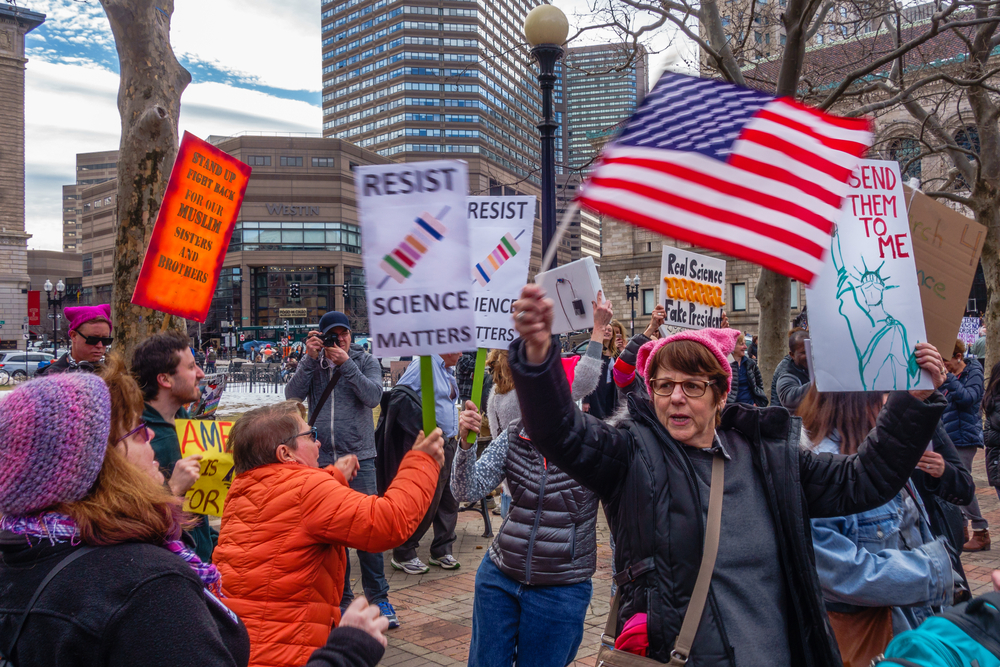Header by Rory Midhani
Feature via Shutterstock
As plans progress for the April 22 “March For Science” pro-science demonstration, debate among scientists has (mildly, politely) bubbled to the surface. In a widely circulated New York Times editorial, coastal geologist Robert S. Young cautioned, “A march by scientists, while well intentioned, will serve only to trivialize and politicize the science we care so much about, turn scientists into another group caught up in the culture wars and further drive the wedge between scientists and a certain segment of the American electorate.” Essentially, science is a politically neutral entity. Don’t bring politics into it or you’ll give people (especially conservatives) the wrong idea.
Here’s the problem with that: all science is and always has been political.

BOSTON, MA USA – FEBRUARY 19, 2017: Protesters hold up signs at the Stand Up for Science Rally in Copley Square Boston. Via Shutterstock.
Before we get into that, though, let’s pause for a second and recognize the momentum behind Young’s particular characterization of science. Both among scientists and non-scientists, it’s common to speak of science as a depersonalized exercise in rational thinking. Scientists rarely discuss how their political beliefs may be influencing their work — and if they do, they certainly never do it within their work.
Since the time of Francis Bacon, scientific writing has intentionally limited the use of first person pronouns in an organized effort to bolster public perception of science’s objectivity. Largely, the campaign has worked. In pop culture today, for example, to indicate that something is an obvious fact, the cheeky phrase “because science” can be used as a shortcut appeal to authority. There’s nothing wrong with this, necessarily, but it’s worth keeping in mind the ways in which language shapes and sometimes limits our worldview. Just because we’re used to talking about science in a particular way doesn’t mean that it’s accurate.
The fact is, science is a social activity carried out by human beings with their own sets of biases. I’ve written previously about how male-dominated fields may unintentionally produce sexist products. This effect is true not only in product development engineering, but also more broadly in science fields; the ideals of the group in power inevitably impact the outcomes. In a stunning piece for the African American Intellectual Historical Society, Christopher F. Petrella recently wrote:
The historical record is replete with examples of the ways in which scientific inquiry and experimentation have sought to naturalize and rationalize the inferiority of people of color and justify their oppression through the language of pathology, deviance, and abnormality. Further, people of color have long served as laboratories for dangerous scientific experimentation. Exposing this lurid history is the first of many steps in forcing mainstream science — often implicitly racialized as white — to confront a historical past that exerts an enduring political force over our historical present.
From the Tuskegee syphilis experiments to modern forced sterilization, science has never been an apolitical enterprise. The danger of talking about science as a series of value-neutral truths is that it obscures the human decision making that took place at every stage along the way, as institutions were built up. It implies that the biases held by those decision makers are shared by everyone, and are therefore insignificant. This is not true — although it does put much of the debate around the March for Science into context. Take a guess which demographics have been coming out in opposition to the March. (Hint: many have never before been asked to consider their own race, gender or sexuality as political!)

Dolores Madrigal (left) and attorney Antonia Hernández (right) at a press conference announcing the 1975 lawsuit Madrigal v. Quilligan. Via No Más Bebés, a documentary film released in 2016 about immigrant mothers who sued after they were pushed into sterilizations while giving birth at the LA USC Medical Center.
Despite all this, science is the best process we’ve got to understand our world. Acknowledging its limitations doesn’t invalidate it; if anything, having open discussions about where bias does and does not exist will strengthen it. And that’s something we should all be invested in, because science benefits everyone.
Within the United States, scientific research is largely funded by taxpayers (rather than corporate interests), and the results drive improvements to agriculture, health care, technology, education and more. Without science, we would have no cancer treatments. We would have no television. We would have no indoor plumbing. Science makes our country great, and it’s something that Democrats and Republicans both have a stake in — because while science is inherently political, it is not inherently partisan. Skepticism and critical thinking are healthy, but science is under serious attack right now. From anti-vaxxers on the left to climate deniers on the right, science is mistrusted across the political spectrum, and the current administration is only making it worse. Keeping our heads down and hoping a “certain segment of the American electorate” comes around is not the way forward. Marching is.




Thanks for this Laura.
What strikes me is that it seems it’s ALWAYS scientists from the “hard sciences”, comfortable in their positivist beliefs, who try to claim that scientific knowledge is “neutral” or “apolitical”. Most of us over here in the social sciences are facepalming over and over again each time.
(also shameless plug for one of my favourite topics, Science and Technology Studies (STS))
Yep.
I think this goes along with the belief from “hard scientists” that theirs is the only “real” science. Part of the definition being “scientific knowledge is apolitical, social sciences are not apolitical, therefore social sciences are not science”. It’s all very No True Scotsman.
Yes!! As someone who is getting a PhD in history with a focus on history of science, I can assure you that science has always been politically driven. Botany, for example, was used ca. 17th-19th century to ferret out cash crops that would justify further expansions of colonization and imperialism. That’s just one addition to the example you provided about race “science” being used to further the political status quo and continue oppression against non-white folks. Thanks for this awesome piece, Laura!
Oh wow. I’d never heard that about botany. Thanks for sharing.
That’s fascinating, Alicia! Do you have any good books to recommend? I studying horticulture right now and it’s been really mind blowing to trace the movement of crops all around the world. Food access and trade are both obviously very politically driven, but I hadn’t heard much about the politics of botany itself. I’d love to read more.
I have so many books! Two of my favorites are Jim Endersby’s Imperial Nature and Richard Drayton’s Nature’s Government, both about England’s use of botany to further their empire. Daniela Bleichmar wrote a beautifully illustrated book about the Spanish empire, Visible Empire. Philip Pauly’s book about US horticulture and politics, Fruits and Plains, is also really good. This list needs more lady authors!
Oh a comment below mentioned Londa Schiebinger whose work is amazing, so giving that a shoutout too here!
Huh, I notice she has a lot of coverage of my field (primatology) in her book. I might have to see if I can get my hands on it.
This sentence made me think: ‘In pop culture today, for example, to indicate that something is an obvious fact, the cheeky phrase “because science” can be used as a shortcut appeal to authority.’
This usage of “because science” has always made me a little bit uncomfortable but I never fully explained to myself why that is. I think you nailed it. It’s the appeal to authority, to some extent, but also the shutting-down-of-discussion that can come with that appeal. When someone asks “why,” a more specific answer than “because science” encourages further inquiry, and helps demystify what science actually is. I know long explanations full of details take time and often aren’t appropriate or even possible. But I think the phrase “because science” comes close to treating science like a religion.
I agree. It’s also spreading the idea that science/scientists are elitist and uninterested in sharing knowledge which I hope is false for a lot of us. It’s also a dangerous idea in this “post fact” society.
It’s ALSO spreading the idea that science is a fixed thing and that once Scientists have Made a Discovery, that discovery can never be challenged. It completely ignores the way that science evolves and rethinks things in the light of new evidence, which in my view is one of the best things about science.
Yeah! It totally shuts conversation down. Really isn’t great for encouraging scientific curiosity in people who aren’t already in the know.
Is it ever scientists saying, “because science” or, as I read it, is this a phrase used in common talk by non-scientists? I can’t imagine a scientist or a science oriented person every saying such a thing. In my experience, scientists like to share their love of their discipline. Maybe that is just my family.
I dunno, I’m torn on this. I think it is really dangerous to give any credence to the idea that science in particular and empirically-driven inquiry more generally is just “another way of knowing”. I will resist that notion until my dying breath, and I’m not shy about saying so. Truth is not socially relative, and yes, we can actually separate the process of science from the people who are doing the science (sorry, science studies person higher up in the thread! hi! my antipathy towards this field is in no way directed at you!) which is why it’s self-correcting over a long enough time scale.
On the other hand, I think it’s necessary to understand that the entire possibility of science (and again, empirically-driven inquiry more generally) rests on certain philosophical commitments beforehand, in the areas of epistemology and, frankly, ethics as well (my opinion). Rather than deny or attempt to obscure those prior philosophical commitments, I think we should bring them out into the open and vigorously defend them. My experience with creationists/ID folks has really crystallized my understanding of the need to do this.
Now, are individual scientists biased? Duh. All people are, to one extent or another (and fascinatingly enough, fields like behavioral economics have started to show how we may be predictably irrational), but adhering to a process of inquiry is the best defense against that. And if someone wants to make the more subtle point that a homogenous scientific community is less likely to be able to spot and recognize its biases (since they point in similar directions), I will be right there with you. The solution, to my mind, is to broaden participation in science. I would like to think this is happening, and insofar as it is, that is a good thing.
Sorry, not sure what’s gotten into me lately – a couple days ago in class, and now here, I’ve just pontificated my ass off on this particular topic. I guess I need to have “Defender of the Enlightenment 4 Lyfe” tattooed on my ass or something.
But science as a process is historically contingent and has changed over time, and is very influenced by politics/society/the economy in terms of who sets the standards and what those standards are. Your point about democratizing science is well taken though!
We should get matching tattoos that read “pontificators at large,” haha.
I’m down for that. I think it’s obvious I used to be a professor. I can’t turn it off. ;) As always, love your column.
Though of course, this hinges on the assumption that we live in a rational universe :)
Another historian weighing in on this topic…
As a scholar of gender and the body, I am constantly amazed by the ways that politics, religion, and gender ideologies have influenced, driven, and/or curtailed advances in science. Works like Londa Schiebinger’s on anatomy and nomenclature (Her essay on why we are called mammals is my personal favorite), Rebecca Scloot’s “The Immortal Life of Henrietta Lacks” and attempts to censure biologist Tyrone Hayes reveal that science has always been about who makes decisions about what is worthy of study and who funds that research.
The Immortal Life Of Henrietta Lacks should be required reading; so good and important.
I’ll have to look up that Londa Schiebinger essay!
Londa Schiebinger yaaaas
Thank you, Laura, for writing about this very important issue in such a beautifully worded way! I have lots of feelings and thoughts about this and you expressed a lot of my thoughts :)
That is so nice to hear! Thank you!
So important, and so well-explained. Thank you!
<3
This post lights all my fires! I studied neuroscience as an undergraduate and was then unable to articulate feelings ranging from discomfort to anger that stemmed from knowing science was indeed political, that what we studied and how we studied it were choices informed by values and politics, not objectivity, whatever that means. So I took an indefinite break from science to study bioethics. Fast forward a million years: I’m still in school, a student of history of public health. Having spent 10 years of my life at the intersections of positivist science and less positivist, yet realist approaches to understanding our social, cultural, and political realities, past and present, I have to say that this post’s contents are so incredibly important. It is both possible and necessary that we defend AND question/challenge scientific thought, methods, and practice, because they are invaluable but not immune to influences of their moment and place ever. EVER. And why would we want them to be?!
Because I haven’t seen this rec here yet and it is SO GOOD: Steven Epstein’s Impure Science, it’s about the role of HIV/AIDS activism in transforming clinical trial policies and practice holy wow
Politics is the science of the heart.
Politics is the science of the heart.
I am all for the March. I would daresay MOST scientists are for the March. Note that the naysayer quoted by the NYT is a coastal geologist – he makes a living from the fossil fuel industry, so suppression of climate change data is A-OK with him. I would think that most other “hard” scientists (physicists, astronomers,in particular) plus pure maths mathematicians would be on board with the March, because this Admin is not going to want to fund joint projects with foreign countries or major equipment within the USA. A few Pharma company scientists may be happy with the relaxation of FDA approval. Otherwise, the biologic and medical sciences community is pretty solidly unhappy with Trump. Engineers – I would guess it’s a wash.
Yes!
Etsy.com/shop/killthepatriarchy